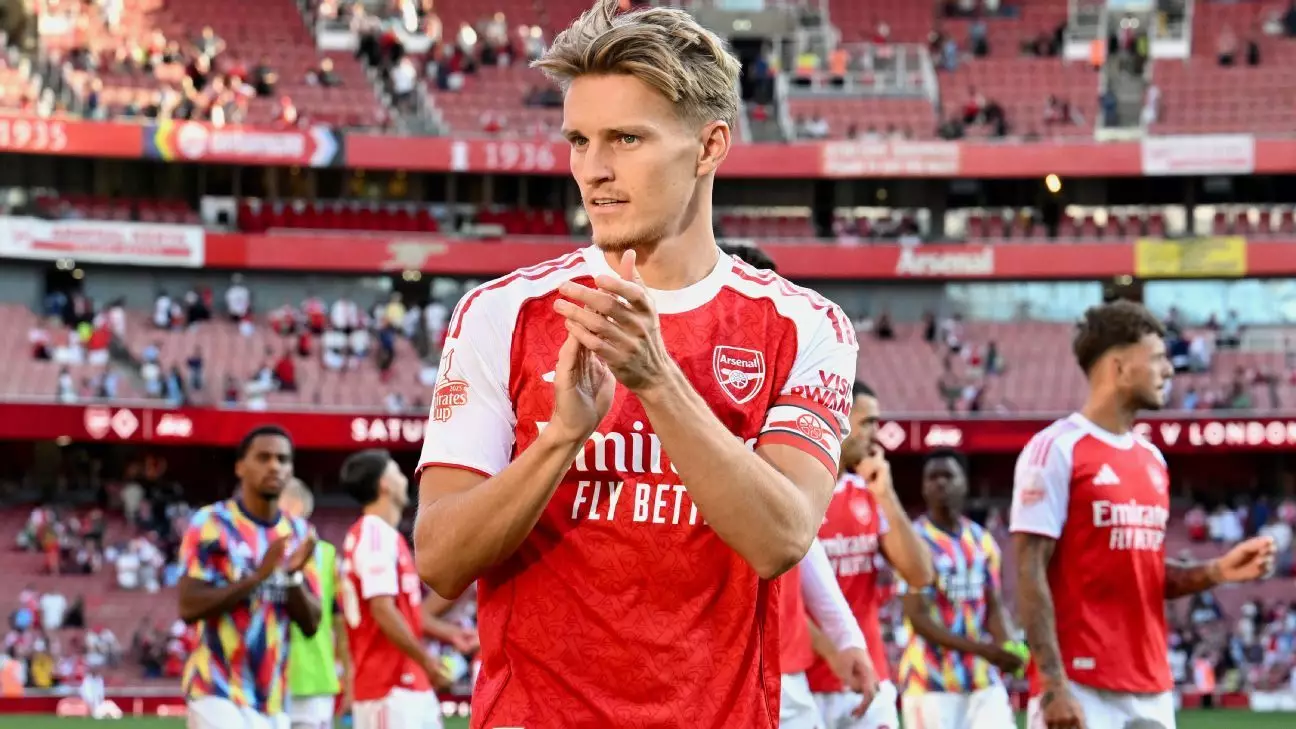In the high-stakes world of Premier League football, leadership is often scrutinized as fiercely as tactical formations. Mikel Arteta’s recent defense of Martin Ødegaard’s captaincy underscores an essential truth: authentic leadership is rooted in trust, consensus, and conviction. Despite vocal criticisms—most notably from former Arsenal captain Tony Adams—Arteta’s steadfastness reveals much about his understanding of team cohesion and the importance of player confidence in leadership roles.
The controversy surrounding Ødegaard’s captaincy illustrates a broader debate about what qualities make an effective leader. Adams’ argument that Arsenal might not, with the Norwegian at the helm, be poised for Premier League triumphs is based on a traditional view that leadership must pivot around a commanding, perhaps more physically imposing figure like Declan Rice. However, Arteta’s rebuttal emphasizes the collective voice of players and staff, pointing to a voting process that overwhelmingly favored Ødegaard. This democratic approach signals a deeper recognition: leadership is not merely about individual qualities but about how a team perceives and supports its figurehead.
Choosing a captain is not just about personal charisma; it is about cultivating unity. Arteta’s confidence in Ødegaard’s leadership stems from a clear understanding that respect, trust, and the ability to inspire are paramount. His statement underscores a mature philosophy—clubs flourish when leadership aligns with player belief, not just external perceptions or traditional expectations. This choice invites us to rethink the archetype of a football captain and accept that effective leadership can come in many forms, especially when validated internally.
Strategic Stability Amid External Criticism
Within the relentless environment of top-tier football, maintaining stability is as crucial as adapting tactics. Arteta’s decision to retain Ødegaard following the departure of Jorginho illustrates a commitment to internal consensus over external noise. His belief that the squad’s collective voice should influence such a pivotal decision reflects a team-oriented mindset that prioritizes harmony and confidence.
This approach is particularly relevant given the intense media and fan scrutiny that accompanies every squad decision. A manager’s role extends beyond tactical adjustments; it involves managing perceptions and fostering a culture of trust. Arteta’s openness about the voting process and his support for Ødegaard serve as a rallying point for players, signaling that their opinions matter and are valued. This dynamic can foster a stronger sense of ownership among squad members, ultimately translating into better on-field chemistry and resilience.
Furthermore, by openly defending his choice amidst criticism, Arteta exemplifies leadership’s importance in the face of adversity. His stance suggests that external opinions, no matter how seasoned or loud, must not overshadow the internal confidence required for success. This is a lesson for clubs across all levels: leadership integrity and internal cohesion can provide the resilience necessary for sustained success.
Adapting to the Modern Game: Rule Changes and Fair Play
Beyond leadership discussions, Arteta’s comments touch on the evolving landscape of Premier League regulations—particularly efforts to curb timewasting and maintain game flow. His acknowledgment of the previous season’s inconsistencies and his optimism about improved enforcement indicate an understanding that modern football demands adaptability.
His proactive stance—calling for clearer guidelines and better referee-coach communication—reflects a recognition that the game’s integrity hinges on fairness and consistency. This is vital not only for maintaining the sport’s competitiveness but also for reinforcing the professionalism of players and officials alike.
Arteta’s emphasis on collective effort to uphold these standards aligns with his broader philosophy: winning is about shared responsibility. Whether defending a captaincy choice or ensuring adherence to rules, the message remains clear—team unity and mutual respect form the foundation of sustained excellence. His optimistic outlook that the Premier League can evolve into the best version of itself underscores a belief in continuous improvement driven by collective accountability.
In essence, Mikel Arteta’s leadership reveals a nuanced understanding of modern football’s complexities. His unwavering support for Ødegaard isn’t just about defending a choice; it signals a broader commitment to internal cohesion, trust, and strategic stability. As Arsenal navigates a fiercely competitive landscape, such conviction—and the willingness to stand firm against criticism—may well be the catalyst that propels them toward their ambitious goals. The true strength of a team lies not only in its tactical prowess but in the confidence of its leadership and the collective belief that they are moving forward together.

